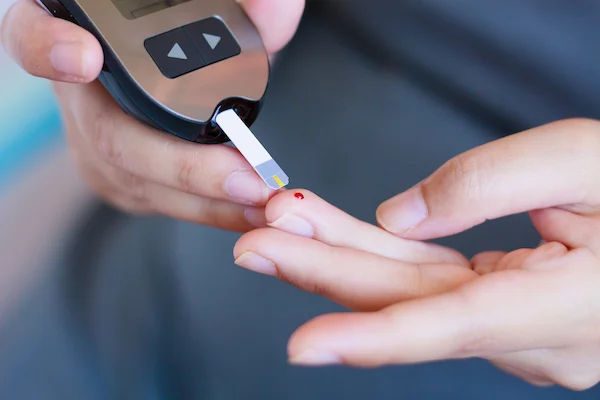Diabetes's Impact on Heart Health
Learn how diabetes affects heart health and increases the risk of heart disease. Discover key symptoms, preventive tips, and lifestyle changes to protect your heart.

Written by Dr. J T Hema Pratima
Reviewed by Dr. D Bhanu Prakash MBBS, AFIH, Advanced certificate in critical care medicine, Fellowship in critical care medicine
Last updated on 22nd Jul, 2025

Introduction
Living with diabetes requires careful attention to your overall health, especially your heart. Diabetes doesn’t just affect blood sugar levels—it can also have a serious impact on your cardiovascular system. Understanding this connection can help you take better care of yourself and reduce risks.
How Does Diabetes Affect the Heart?
Diabetes, particularly when uncontrolled, increases the risk of heart disease. High blood sugar levels over time can damage blood vessels and nerves that control the heart. Here’s how:
High Blood Sugar damages blood vessel walls, making them stiff and narrow, which can lead to poor circulation.
Increased Cholesterol Levels: Diabetes often raises LDL ("bad" cholesterol) and lowers HDL ("good" cholesterol), leading to plaque buildup in arteries.
High Blood Pressure: Many people with diabetes also have hypertension, putting extra strain on the heart.
Inflammation: Chronic high sugar levels cause inflammation, further harming blood vessels.
Because of these factors, people with diabetes are twice as likely to develop heart disease or suffer a stroke compared to those without diabetes.
Common Heart Conditions Linked to Diabetes
1. Coronary Artery Disease (CAD): Plaque buildup narrows the arteries, reducing blood flow to the heart, which can cause chest pain (angina) or heart attacks.
2. Heart Failure: Diabetes weakens the heart muscle over time, making it harder for the heart to pump blood efficiently.
3. Diabetic Cardiomyopathy: A condition where the heart muscle becomes thick and stiff, leading to poor heart function.
4. Peripheral Artery Disease (PAD): Narrowed blood vessels reduce circulation in the legs and feet, increasing the risk of infections and slow healing.
Warning Signs of Heart Trouble
Since diabetes can sometimes mask heart disease symptoms, it’s important to watch for:
Chest pain or discomfort (pressure, tightness, burning)
Shortness of breath (even with mild activity)
Irregular heartbeat (palpitations)
Swelling in legs, ankles, or feet
Extreme fatigue
Dizziness or fainting
If you experience any of these, consult a doctor immediately.
How to Protect Your Heart if You Have Diabetes
The good news is that you can take steps to lower your risk of heart disease:
1. Manage Blood Sugar Levels
Monitor glucose regularly.
Follow your doctor’s advice on medications (like insulin or oral drugs).
Aim for an HbA1c level below 7% (as recommended by your doctor).
2. Control Blood Pressure & Cholesterol
Keep blood pressure below 130/80 mmHg.
Reduce LDL cholesterol (bad cholesterol) through diet and medication if needed.
Increase HDL cholesterol (good cholesterol) with healthy fats like nuts, olive oil, and fish.
Get Your Symptoms Checked By An Endocrinologist
3. Adopt a Heart-Healthy Diet
Eat more: Whole grains, vegetables, fruits, lean proteins (fish, chicken, beans), and healthy fats.
Avoid: Sugary foods, processed snacks, fried foods, and excessive salt.
Portion control helps maintain weight and blood sugar levels.
4. Stay Active
Aim for 150 minutes of moderate exercise per week (walking, swimming, cycling).
Strength training (twice a week) helps improve insulin sensitivity.
Even small activities like taking the stairs or short walks help!
5. Quit Smoking & Limit Alcohol
Smoking worsens blood vessel damage—seek help to quit if needed.
Alcohol can raise blood sugar and blood pressure—consume in moderation.
6. Manage Stress
Chronic stress raises blood sugar and blood pressure.
Try relaxation techniques like deep breathing, yoga, or meditation.
7. Regular Health Check-ups
Get annual heart health screenings (ECG, lipid profile, kidney function tests).
Monitor blood pressure, cholesterol, and kidney function regularly.
When to See a Doctor?
If you have diabetes, regular heart check-ups are crucial. Book a consultation if you notice:
Unexplained chest pain
Sudden shortness of breath
Severe dizziness or fatigue
Swelling in the legs or feet
Early detection and proper management can greatly reduce heart risks.
Conclusion
Diabetes and heart health are closely linked, but with the right lifestyle changes and medical care, you can protect your heart. Small, consistent steps, like eating well, staying active, and monitoring your health, can make a big difference.
If you need guidance, Apollo 24|7 offers expert consultations and heart health screenings to help you stay on track. Schedule a test or talk to a specialist today to keep your heart strong and healthy!
Get Your Symptoms Checked By An Endocrinologist
Get Your Symptoms Checked By An Endocrinologist

Dr. Nithin Reddy Modhugu
Endocrinologist
6 Years • MBBS, MD (General Medicine), DNB (Endocrinology)
Hyderabad
Dr. Nithin's Endocrine Clinic, Hyderabad
(100+ Patients)

Dr. Gayatri S
Endocrinologist
4 Years • Suggested Qualifictaion- MBBS, MD (Internal Medicine), DM (ENDOCRINOLOGY)
Nellore
Narayana hospital, Nellore

Dr. Shiva Madan
Endocrinologist
10 Years • MBBS , MD (General medicine) , DM (Endocrinology)
Bikaner
Sushma diabetes and Endocrine center, Bikaner

Dr. Venkata Rakesh Chintala
Endocrinologist
8 Years • MBBS,MD( GEN MEDICINE), DM ( ENDOCRINOLOGY)
Krishna district
Sanjeevani Hospital, Krishna district

Dr. Arunava Ghosh
General Physician/ Internal Medicine Specialist
9 Years • MBBS,MD(GENL.MED.),DM(ENDOCRINOLOGY)
Kolkata
VDC Clinic, Kolkata


